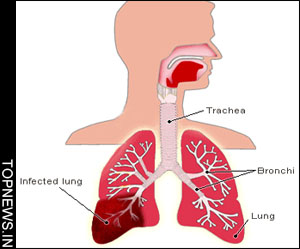Older men more likely to die after pneumonia than women
 Washington, April 30 : Old men are more likely do die after being hospitalized with community-acquired pneumonia (CAP) than women, according to a new study, which suggests that the reason may be differing biological response to infection between males and females.
Washington, April 30 : Old men are more likely do die after being hospitalized with community-acquired pneumonia (CAP) than women, according to a new study, which suggests that the reason may be differing biological response to infection between males and females.
The findings may have important implications for understanding sex differences in life expectancy.
"Our study found that men with CAP were less likely to survive after an infection compared to women and this was not explained by differences in demographics, health behaviour, chronic health conditions or quality of care," said Sachin Yende, M. D., assistant professor in the Department of Critical Care Medicine at the University of Pittsburgh School of Medicine and corresponding author of the study.
The researchers measured blood levels of inflammatory indicators, including tumour necrosis factor (TNF) and interleukins 6 and 10, coagulation indicators including Factor IX, and fibrinolysis indicators including D-dimer concentrations.
They found patterns in these biomarkers that suggest men generate a stronger inflammatory and coagulation response and, perhaps, break up blood clots more quickly than women in response to infection.
"These differences in inflammatory, coagulation and fibrinolysis biomarkers among men may explain the reduced short-term and long-term survival," said Dr. Yende.
Data were gathered from the multicenter Genetic and Inflammatory Markers of Sepsis (GenIMS) study. Participants were enrolled upon emergency department admission at 28 academic and community hospitals in Pennsylvania, Connecticut, Michigan and Tennessee from 2001 to 2003.
The study included 2,320 subjects, with a mean age of 64.9 years, 1,136 of whom were men. The men were sicker on admission, more likely to be smokers, and had at least one chronic health condition, such as cardiac disease or cancer. Severe sepsis occurred in 588 (31 percent) subjects. Of these, about half had severe sepsis on their first day of hospitalization.
The researchers found that men had a higher risk than women of death at 30 days (7 percent vs. 4.5 percent), 90 days (11.4 percent vs. 8.6 percent) and one year (21 percent vs. 16 percent).
"Even compared to women with an equivalent illness severity, men were more likely to die. Survival differences persist up to one year after the initial hospitalization, when most patients had recovered from the pneumonia and left the hospital," Dr. Yende said.
The study is published online in the Critical Care Medicine journal. (ANI)